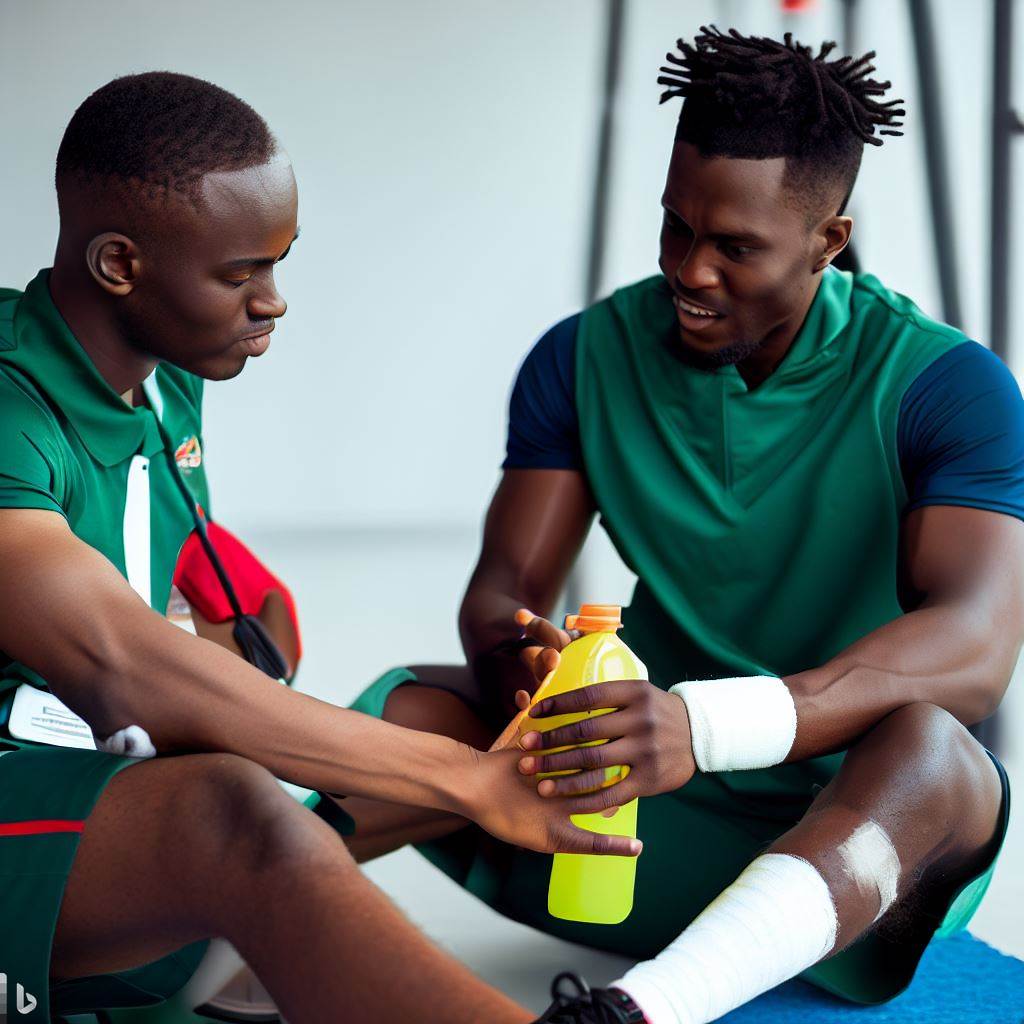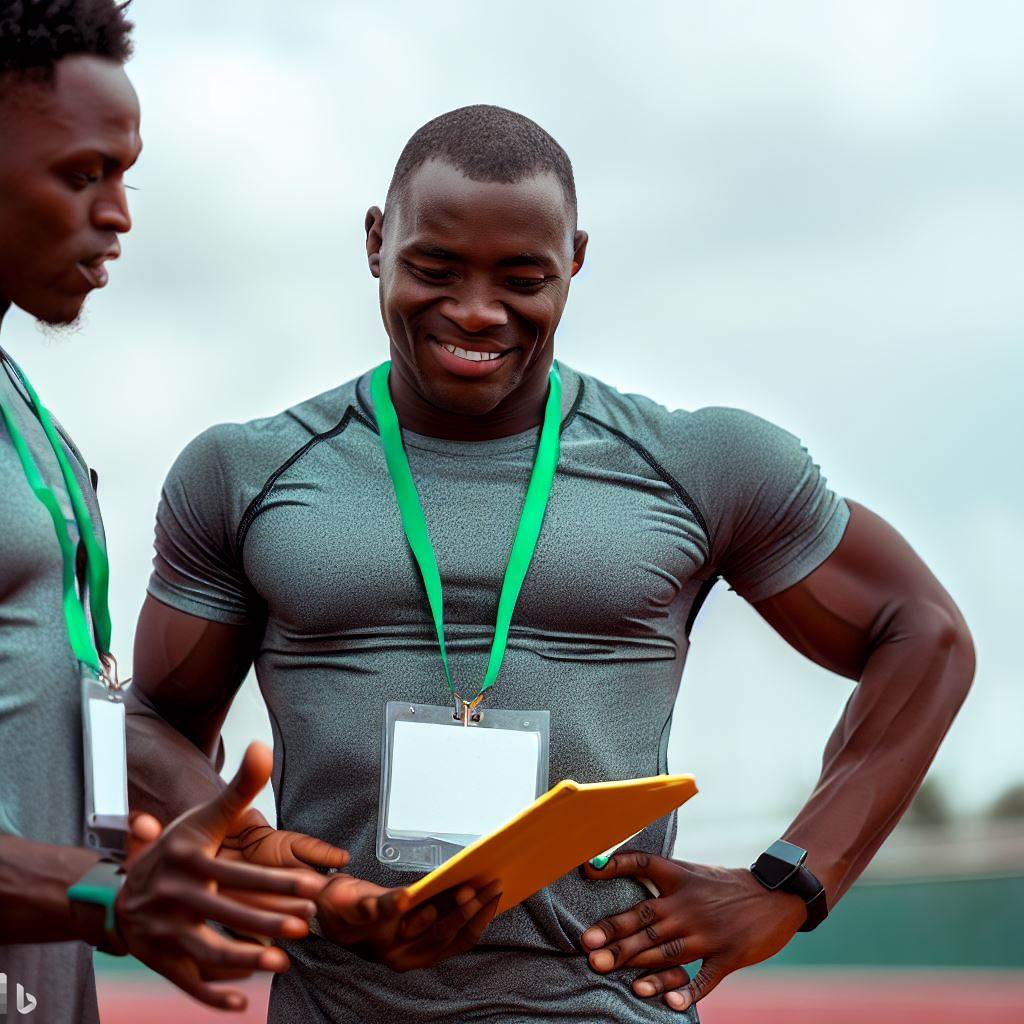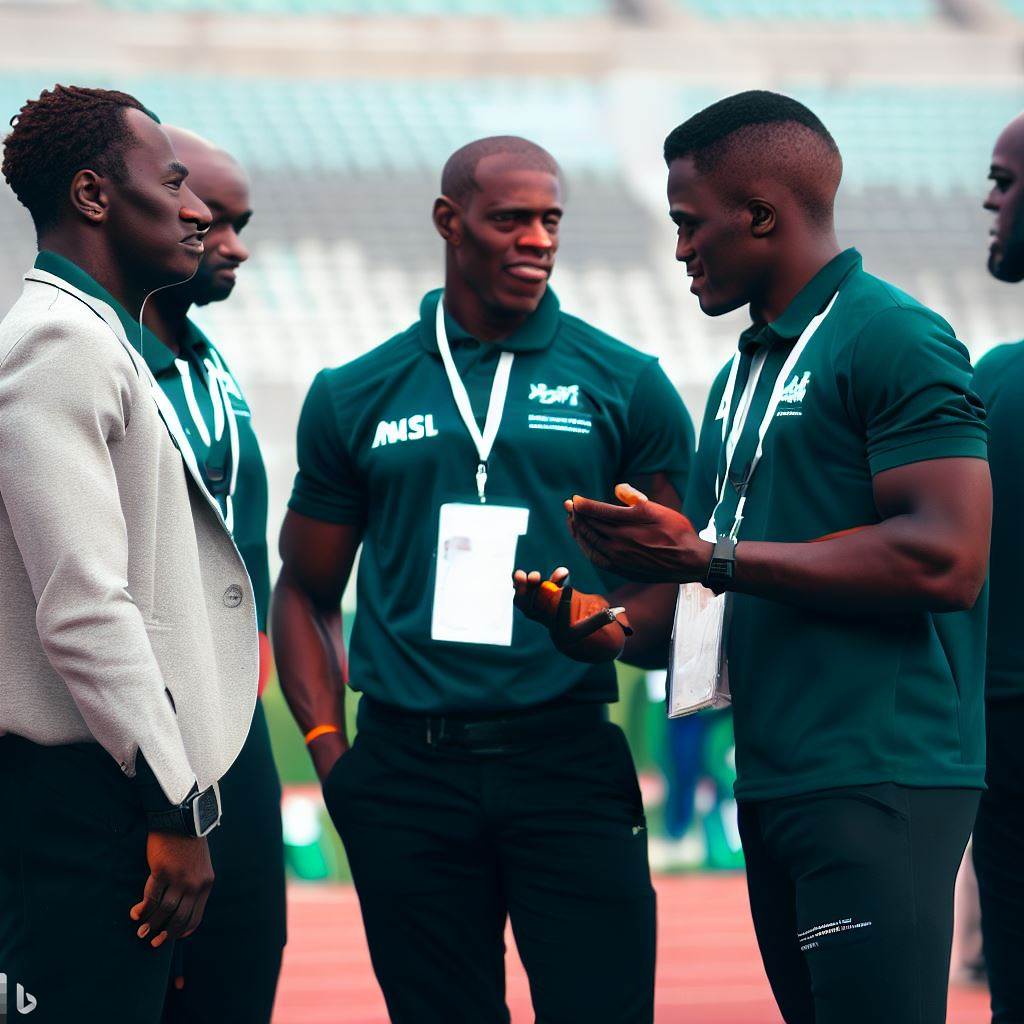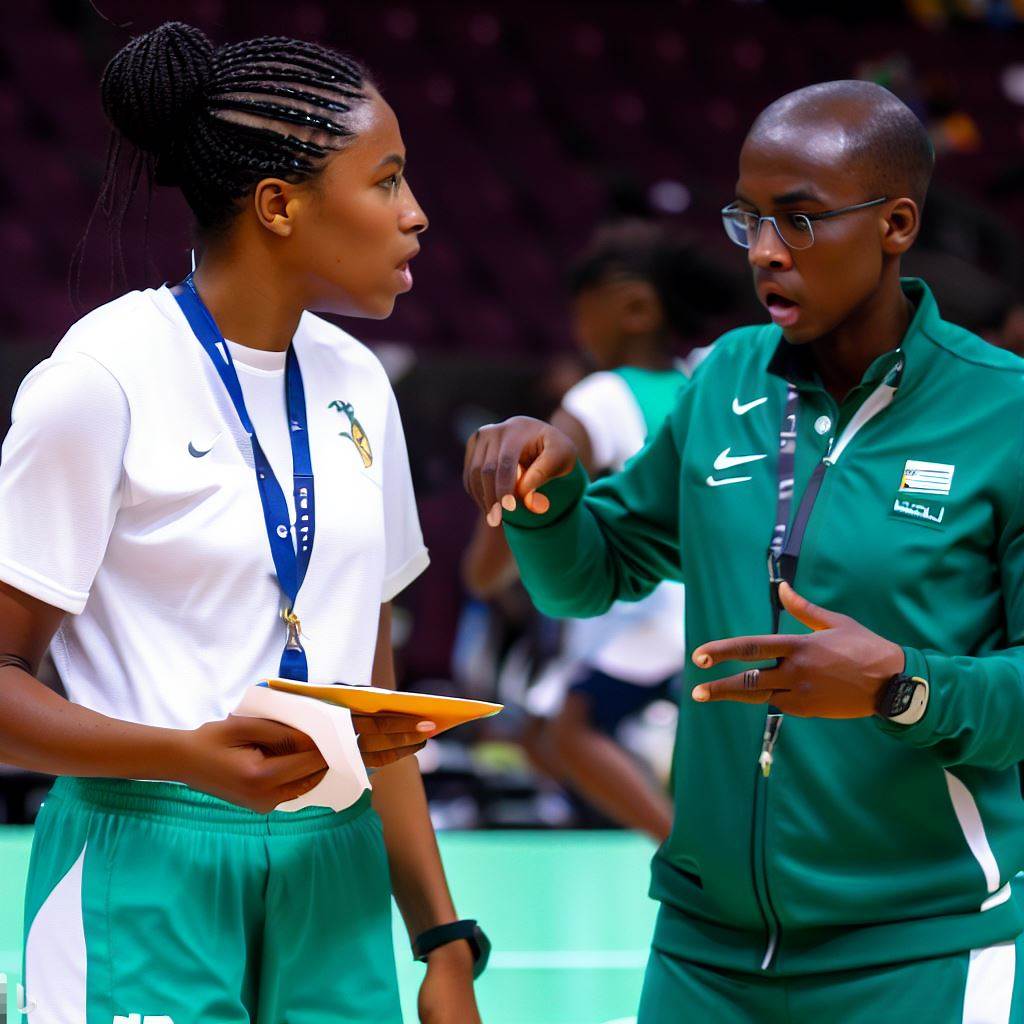Introduction
The role of an assistant athletic trainer is crucial in ensuring the well-being and performance of athletes.
This blog post focuses on the path to success as an assistant athletic trainer in Nigeria.
A. Brief overview of the role of an Assistant Athletic Trainer
An assistant athletic trainer supports the head athletic trainer in providing preventive care, injury evaluation, and rehabilitation to athletes.
They also educate athletes on injury prevention techniques and administer first aid when necessary.
Nigeria, known for its vibrant sports culture and talented athletes, presents unique opportunities and challenges for aspiring assistant athletic trainers.
B. Nigeria as the focus of the blog post
This blog post aims to shed light on the path to success within the Nigerian sports industry.
In Nigeria, sports play a significant role in the nation’s identity, with a wide range of sports disciplines attracting a devoted fan base.
This enthusiasm creates an environment that demands skilled athletic trainers who can efficiently manage injuries and optimize athlete performance.
To excel as an assistant athletic trainer in Nigeria, a strong educational background in sports medicine, exercise science, or a related field is essential.
Additionally, gaining hands-on experience through internships or apprenticeships with local sports teams or medical facilities can provide valuable practical skills.
Developing a network within the Nigerian sports industry is also crucial for success.
Attending professional conferences, joining local sports medicine organizations, and building relationships with coaches, athletes, and fellow trainers can open doors to opportunities and advancements.
In essence, becoming a successful assistant athletic trainer in Nigeria requires a combination of education, practical experience, and networking within the sports industry.
The next section of this blog will delve deeper into these aspects, providing valuable insights and guidance for aspiring athletic trainers in Nigeria.
Overview of the Athletic Training Profession in Nigeria
The athletic training profession in Nigeria encompasses various roles that focus on the prevention, management, and rehabilitation of sports injuries.
Athletic trainers play a vital role in ensuring the overall well-being and performance of athletes.
- Athletic trainers implement preventive measures to minimize the risk of injuries during training and competition.
- They provide immediate medical care to injured athletes, assessing the severity of injuries and providing appropriate treatments.
- Athletic trainers also develop and implement rehabilitation programs to aid in the recovery process of athletes.
- They collaborate with other healthcare professionals and coaches to ensure a comprehensive approach to athlete care.
With the growing popularity and recognition of athletic trainers in Nigeria, the profession has gained credibility and importance in the sports industry.
A. The increasing popularity and recognition of athletic trainers in Nigeria
There are several factors contributing to the increasing popularity and recognition of athletic trainers in Nigeria.
- Nigeria’s growing participation in international sporting events has highlighted the importance of proper sports medicine practices.
- The improvement in sports infrastructure and facilities has raised the need for qualified athletic trainers to ensure the safety and well-being of athletes.
- The success stories of athletes who have benefited from the services of athletic trainers have showcased the tangible results that can be achieved through their expertise.
- Increased media coverage and public awareness of sports injuries have emphasized the significance of having trained professionals to address these concerns.
B. Demand for assistant athletic trainers in sports institutions and organizations
The demand for assistant athletic trainers in sports institutions and organizations in Nigeria is on the rise.
- Sports institutions recognize the necessity of having a team of athletic trainers to provide comprehensive medical support to their athletes.
- The increasing number of sports organizations in Nigeria has created more opportunities for assistant athletic trainers to work with diverse athletes.
- The demand for assistant athletic trainers is fueled by the need to ensure the long-term health and career longevity of athletes.
- Assistant athletic trainers play a crucial role in supporting head athletic trainers and collaborating with other healthcare professionals to deliver optimal care.
Most Importantly, the athletic training profession in Nigeria has witnessed significant growth and recognition in recent years.
The role of assistant athletic trainers is crucial in providing comprehensive care to athletes, preventing injuries, and supporting their rehabilitation.
As Nigeria continues to invest in sports and athletics, the demand for qualified assistant athletic trainers will continue to rise, creating new pathways for success in this field.
Read: How to Succeed in the Nigerian Professional Sports Scene
Educational Requirements and Qualifications for an Assistant Athletic Trainer in Nigeria
When pursuing a career as an assistant athletic trainer in Nigeria, there are several educational requirements and qualifications that one must meet.
These requirements ensure that individuals are equipped with the necessary knowledge and skills to excel in this role.
A. Educational Requirements
The educational requirements for an assistant athletic trainer in Nigeria typically include a minimum of a bachelor’s degree in athletic training or related field.
This degree provides individuals with a solid foundation in the principles and practices of athletic training.
In addition to a bachelor’s degree, aspiring assistant athletic trainers may also need to obtain relevant certifications.
These certifications demonstrate their competence and proficiency in the field.
B. Academic Degrees and Certifications
An assistant athletic trainer in Nigeria may be expected to possess certifications such as the Certified Athletic Trainer (ATC) certification.
This certification is awarded by the National Athletic Trainers’ Association (NATA) and requires a bachelor’s degree from an accredited athletic training program.
Furthermore, obtaining a master’s degree in athletic training or a related field can enhance one’s qualifications for this role.
A master’s degree provides a more in-depth understanding of advanced techniques and research methods in the field of athletic training.
C. Specialized Training and Courses
In Nigeria, there may be specialized training programs or courses available for assistant athletic trainers to further enhance their knowledge and skills.
These programs focus on addressing the unique challenges and needs of athletes in the Nigerian context.
For instance, specialized courses may cover topics such as sports injuries prevalent in Nigeria, cultural considerations in athletic training, and strategies for working with Nigerian athletes.
These courses ensure that assistant athletic trainers are well-prepared to provide optimal care for athletes in the Nigerian sports industry.
Summarily, aspiring assistant athletic trainers in Nigeria must meet specific educational requirements and qualifications.
These include a bachelor’s degree in athletic training or a related field, certifications such as the ATC certification, and potentially a master’s degree.
Additionally, specialized training programs and courses can further enhance the knowledge and skills of assistant athletic trainers specifically tailored to the Nigerian context.
Read: Top Challenges Faced by Nigerian Athletes Today
Roles and Responsibilities of an Assistant Athletic Trainer in Nigeria
An assistant athletic trainer in Nigeria plays a crucial role in ensuring the well-being and optimal performance of athletes.
They are responsible for various tasks related to injury prevention, evaluation, and rehabilitation.
Additionally, their work requires collaboration with athletes, coaches, and other healthcare professionals.
A. Injury Prevention
- Assessing and identifying potential risk factors for injuries among athletes.
- Developing and implementing injury prevention programs tailored to athletes’ specific needs.
- Educating athletes about proper warm-up, stretching, and strength conditioning techniques.
- Conducting regular training sessions on injury prevention strategies for coaches and athletes.
- Monitoring and analyzing athletes’ movements and techniques to minimize injury risks.
B. Evaluation
- Assessing and diagnosing athletic injuries or issues through physical examinations.
- Utilizing various diagnostic tools, such as X-rays and MRI scans, to evaluate injuries.
- Referring athletes to specialized healthcare professionals for further evaluation when necessary.
- Creating detailed reports on injury assessments, including treatment plans and progress updates.
- Collaborating with athletes to track their recovery process and make necessary modifications to treatment plans.
C. Rehabilitation
- Creating personalized rehabilitation plans for athletes based on their specific injuries or conditions.
- Implementing rehabilitation exercises and techniques to promote healing and recovery.
- Monitoring athletes’ progress during rehabilitation and adjusting treatment plans accordingly.
- Collaborating with strength and conditioning coaches to ensure safe and effective return to sports activities.
- Providing continuous support and guidance to athletes throughout the entire rehabilitation process.
D. Collaborative Nature of the Role
Working as an assistant athletic trainer in Nigeria requires close collaboration with various stakeholders involved in an athlete’s development and well-being.
- Collaborating with coaches to develop comprehensive training programs that align with athletes’ physical capabilities and goals.
- Communicating and coordinating with team physicians to ensure accurate diagnosis and appropriate treatment plans.
- Collaborating with strength and conditioning coaches to integrate injury prevention techniques into athletes’ training routines.
- Coordinating with physical therapists to implement specific rehabilitation exercises and monitor athletes’ progress.
- Providing educational sessions to athletes, coaches, and other healthcare professionals to increase awareness about injury prevention and management.
Essentially, an assistant athletic trainer in Nigeria carries out crucial roles and responsibilities in ensuring the well-being and performance of athletes.
Their tasks include injury prevention, evaluation, and rehabilitation, all of which require collaboration with athletes, coaches, and other healthcare professionals.
By effectively fulfilling their responsibilities, assistant athletic trainers contribute to the success of athletes in Nigeria.
Challenges Faced by Assistant Athletic Trainers in Nigeria
Assistant athletic trainers play a crucial role in the healthcare of athletes, but in Nigeria, they face numerous challenges that hinder their success.
This blog post aims to shed light on the common obstacles they encounter, such as limited resources and funding for healthcare in sports, as well as the need for better recognition and support from sports institutions and organizations.
1. Limited Resources
- Shortage of medical equipment and supplies affects the quality of care assistant athletic trainers can provide.
- Insufficient access to advanced diagnostic tools hampers accurate injury assessment and treatment.
- A lack of proper training facilities limits the trainers’ ability to implement rehabilitation programs effectively.
- Inadequate staffing levels put excessive workload on assistant athletic trainers, compromising athlete care.
2. Funding Challenges
- Availability of funds for sports healthcare programs is often limited, preventing trainers from offering comprehensive care.
- Inconsistent financial support leads to difficulty in procuring essential equipment and maintaining necessary facilities.
- Budget constraints often result in lower salaries for assistant athletic trainers, affecting their motivation and job satisfaction.
- The inability to secure sponsorships or endorsements further reduces the resources available for quality sports healthcare.
3. Lack of Recognition and Support
- Assistant athletic trainers in Nigeria struggle to gain recognition for their vital role in athlete welfare.
- Many sports institutions and organizations fail to acknowledge the significance of proper healthcare in maximizing athletic performance.
- Absence of standardized policies and regulations for sports healthcare undermines the credibility and professionalism of trainers.
- Inadequate collaborations between athletic trainers and coaches hinder effective injury prevention and performance enhancement.
Finally, assistant athletic trainers in Nigeria face significant challenges, including limited resources, funding constraints, and a lack of recognition and support from sports institutions and organizations.
To overcome these obstacles and pave the path to success, it is crucial for the government, sports authorities, and stakeholders to prioritize sports healthcare and invest in adequate resources, funding, and recognition for assistant athletic trainers.
By doing so, Nigeria can enhance its sports industry and ensure the well-being and performance of its athletes.
Read: Promoting Sportsmanship: Lessons from Nigerian Athletes

Success stories and achievements of assistant athletic trainers in Nigeria
In Nigeria, assistant athletic trainers have played a significant role in the success of athletes and sports teams.
These dedicated professionals have made notable accomplishments and contributions to the field, inspiring others with their stories of triumph.
Inspiring stories of individuals who have succeeded in their careers
- John Ogbonna, an assistant athletic trainer, started his career in a local sports clinic.
- Despite limited resources, Ogbonna dedicated himself to learning and improving his skills.
- His determination and passion for helping athletes led him to work with top sports teams in Nigeria.
- Ogbonna’s success story has inspired many aspiring athletic trainers to pursue their dreams.
- Maryam Ibrahim, another assistant athletic trainer, faced numerous challenges throughout her career.
- Despite societal expectations, she remained steadfast in her pursuit of a career in sports medicine.
- Today, Ibrahim is recognized as one of the leading assistant athletic trainers in the country.
- Her journey serves as an inspiration to young women who aspire to break gender barriers.
Notable accomplishments and contributions made by assistant athletic trainers in Nigeria
- Assistant athletic trainers have played a crucial role in injury prevention and rehabilitation.
- Their expertise in sports medicine has aided in reducing the recovery time for injured athletes.
- Through their continuous efforts, they have improved the performance and longevity of athletes in Nigeria.
- Assistant athletic trainers have also introduced innovative techniques and training methods.
- These advancements have enhanced the overall competitiveness and success of Nigerian athletes.
- Furthermore, assistant athletic trainers have played a pivotal role in educating athletes about nutrition and hydration.
- They have created awareness and instilled healthy habits that contribute to overall athlete well-being.
- Several assistant athletic trainers have been recognized for their contributions to the development of sports medicine in Nigeria.
- Their research and publications have advanced the knowledge in the field, benefiting not just Nigerian athletes but the global sports community as well.
- Assistant athletic trainers have championed the importance of mental health in sports.
- They have actively promoted awareness and provided support to athletes facing psychological challenges.
- Their holistic approach to athlete care has fostered a positive and encouraging environment in sports.
In a nutshell, assistant athletic trainers in Nigeria have achieved remarkable success stories, inspiring others with their determination, dedication, and contributions to the world of sports.
Their accomplishments in injury prevention, rehabilitation, innovation, and athlete well-being have elevated the standards of sports medicine in the country.
These professionals continue to make a significant impact, fostering the growth and success of Nigerian athletes.
Read: Rising Stars in Nigeria’s Sports and Athletics Scene
Explore Further: Steps to Building a Career in Nigeria’s Sports Field
Opportunities and future prospects for assistant athletic trainers in Nigeria
As Nigeria’s athletics field expands, demand for assistant trainers rises. They ensure athlete well-being.
Opportunities grow with sports’ rise. Trainers work in diverse sports including traditional ones.
Future prospects are bright due to Nigeria’s sports passion and investment.
Success in international competitions increases need for trained trainers. Academic institutions seek athletic trainers for their thriving sports programs.
In fitness industry, trainers aid health-conscious individuals.
They prevent injuries, aiding fitness goals. Growth lies in pursuing advanced degrees, certifications, and workshops.
Expanding expertise leads to leadership roles and clinics establishment. Networking opens doors for career advancement and international exposure.
Nigeria’s sports culture fuels athletic training’s growth potential.
Trainers contribute to sports development and athletes’ potential realization. Recognition rises, enhancing career opportunities in this field.
Ultimately, the future looks bright for assistant athletic trainers in Nigeria.
With expanding opportunities in various sports sectors and avenues for professional development, those aspiring to be assistant athletic trainers can find a fulfilling and successful career path in the country’s sports landscape.
Conclusion
Pursuing a career as an assistant athletic trainer in Nigeria can lead to numerous benefits and opportunities.
The importance of this profession cannot be overstated, as athletes rely heavily on the expertise and support provided by athletic trainers.
By working closely with athletes, assistant athletic trainers play a crucial role in preventing, diagnosing, and treating injuries.
Their understanding of sports medicine and exercise science helps in enhancing performance and promoting overall well-being.
Furthermore, the demand for athletic trainers is steadily increasing in Nigeria, creating a promising job market for aspiring professionals.
With proper education and training, individuals can embark on this rewarding career path to make a difference in the lives of athletes.
Aspiring athletic trainers should be encouraged to pursue their passion and invest in acquiring the necessary skills and knowledge.
They should embrace opportunities for internships, certifications, and continuous learning to stay updated with the latest advancements in sports medicine.
While the journey to becoming a successful assistant athletic trainer may be challenging, it is ultimately worthwhile.
With dedication, hard work, and a strong commitment to the profession, individuals can pave the way for a successful and fulfilling career in Nigeria’s athletic training industry.




